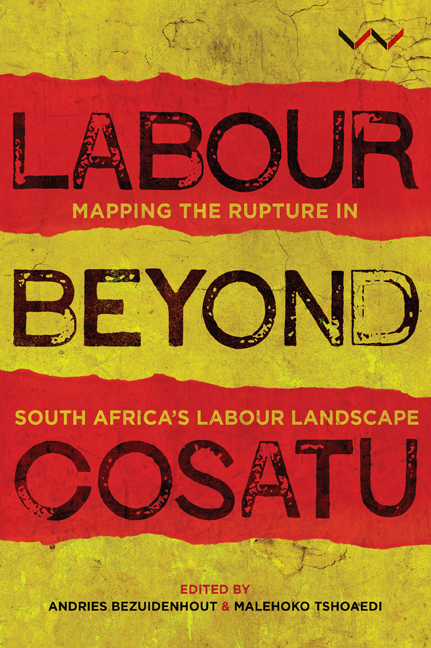Book contents
- Frontmatter
- Contents
- Figures and Tables
- Abbreviations and Acronyms
- Preface
- Chapter 1 Democracy and the Rupture in South Africa's Labour Landscape
- Chapter 2 Research in a Highly Charged Environment: Taking Democracy Seriously, 2014
- Chapter 3 The Social Character of Labour Politics
- Chapter 4 Is Cosatu Still a Working-Class Movement?
- Chapter 5 Labour Aristocracy or Marginal Labour Elite? Cosatu members' income, other sources of livelihood and household support
- Chapter 6 The Politics of Alliance and the 2014 Elections
- Chapter 7 Cosatu, Service Delivery, Civil Society and the Politics of Community
- Chapter 8 The Politics of Male Power and Privilege in Trade Unions: Understanding sexual harassment in Cosatu
- Chapter 9 Internal Democracy in Cosatu: Achievements and challenges
- Chapter 10 Public Sector Unions in Cosatu
- Chapter 11 Are Cosatu's Public Sector Unions Too Powerful?
- Chapter 12 Labour Beyond Cosatu, Other Federations and Independent Unions
- Contributors
- Index
Chapter 12 - Labour Beyond Cosatu, Other Federations and Independent Unions
Published online by Cambridge University Press: 21 March 2018
- Frontmatter
- Contents
- Figures and Tables
- Abbreviations and Acronyms
- Preface
- Chapter 1 Democracy and the Rupture in South Africa's Labour Landscape
- Chapter 2 Research in a Highly Charged Environment: Taking Democracy Seriously, 2014
- Chapter 3 The Social Character of Labour Politics
- Chapter 4 Is Cosatu Still a Working-Class Movement?
- Chapter 5 Labour Aristocracy or Marginal Labour Elite? Cosatu members' income, other sources of livelihood and household support
- Chapter 6 The Politics of Alliance and the 2014 Elections
- Chapter 7 Cosatu, Service Delivery, Civil Society and the Politics of Community
- Chapter 8 The Politics of Male Power and Privilege in Trade Unions: Understanding sexual harassment in Cosatu
- Chapter 9 Internal Democracy in Cosatu: Achievements and challenges
- Chapter 10 Public Sector Unions in Cosatu
- Chapter 11 Are Cosatu's Public Sector Unions Too Powerful?
- Chapter 12 Labour Beyond Cosatu, Other Federations and Independent Unions
- Contributors
- Index
Summary
INTRODUCTION
For roughly four decades, starting with the formation of Cosatu in 1985, the South African labour landscape was dominated by this labour federation with, at its high point, the 2.2 million members of its affiliated trade unions. South African labour scholarship is also dominated by studies of the history of Cosatu, its leadership figures and its affiliated unions. This is, perhaps, not surprising, as the federation played an important role in the struggle against apartheid, and that phase of its history has been described as an example of social movement unionism (Von Holdt 2002; Webster 1988). The federation also wielded immense political influence owing to its mass base and because it was (and remains) in an alliance with the ANC as the ruling party. Cosatu, along with Fedusa with its 550 000 members and Nactu with approximately 300 000 members, represented organised labour in Nedlac.
Despite attempts by Fedusa and Nactu to merge, this landscape remained stable for twenty years. Two events fundamentally altered this stability. The first is the rise of Amcu, which gave Nactu a new lease on life, most probably also ending the possibility for unity with Fedusa. The second is the expulsion of Numsa from Cosatu, which opens up the future to a number of possibilities. Whether Cosatu will remain the dominant player is largely dependent on how the boundaries and spheres of influence are redrawn on this new labour landscape.
In addition to the three major players, and now Numsa as a potential fourth national player (at the time of writing Numsa was still in the process of setting up the South African Federation of Trade Unions (Saftu)), we should mention the increasingly active role played by the neo-nationalist Afrikaner trade union Solidariteit (or Solidarity, in English), along with its civil society arm AfriForum and a range of affiliated training institutions. Solidariteit is affiliated to the Confederation of South African Workers’ Unions (Consawu), but is the only major union in this federation. It has been agitating to become a member of Nedlac, but up to now has not been successful in this.
Then there are a number of independent unions not affiliated to any labour federation. In terms of membership figures the most significant of these is probably the PSA. A number of new players have also emerged in the organising vacuums left by existing unions in sectors such as agriculture.
- Type
- Chapter
- Information
- Labour Beyond CosatuMapping the Rupture in South Africa's Labour Landscape, pp. 217 - 234Publisher: Wits University PressPrint publication year: 2017



